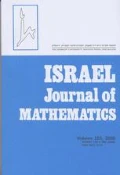Abstract
Type spaces in the sense of Harsanyi (1967/68) play an important role in the theory of games of incomplete information. They can be considered as the probabilistic analog of Kripke structures. By an infinitary propositional language with additional operators “individual i assigns probability at least α to” and infinitary inference rules, we axiomatize the class of (Harsanyi) type spaces. We prove that our axiom system is strongly sound and strongly complete. To the best of our knowledge, this is the very first strong completeness theorem for a probability logic with σ-additive probabilities. We show this by constructing a canonical type space whose states consist of all maximal consistent sets of formulas. Furthermore, we show that this canonical space is universal (i.e., a terminal object in the category of type spaces) and beliefs complete.
Similar content being viewed by others
References
W. Armbruster and W. Böge, Bayesian game theory, in Game Theory and Related Topics, (O. Moeschlin and D. Pallaschke, es.), North-Holland, Amsterdam, 1979.
R. J. Aumann, Agreeing to disagree, The Annals of Statistics 4 (1976), 1236–1239.
R. J. Aumann, Interactive epistemology, Discussion paper Nr. 67, Center of Rationality and Interactive Decision Theory, The Hebrew University of Jerusalem, 1995.
R. J. Aumann, Interactive epistemology I: Knowledge, International Journal of Game Theory 28 (1999), 263–300.
R. J. Aumann, Interactive epistemology II: Probability, International Journal of Game Theory 28 (1999), 301–314.
R. J. Aumann and A. Brandenburger, Epistemic conditions for Nash equilibrium, Econometrica 63 (1995), 1161–1180.
R. J. Aumann and A. Heifetz, Incomplete information, in Handbook of Game Theory, Volume 3, (R.J. Aumann and S. Hart, eds.), Elsevier/North-Holland, Amsterdam 2002, pp. 1665–1686.
P. Battigalli and M. Siniscalchi, Hierarchies of conditional beliefs and interactive epistemology in dynamic games, Journal of Economic Theory 88 (1999), 188–230.
W. Böge and Th. Eisele, On solutions of Bayesian games, International Journal of Game Theory 8 (1979), 193–215.
A. Brandenburger, On the Eexistence of a ‘complete’ possibility structure, in Cognitive Processes and Economic Behavior, (Marcello Basili, Nicola Dimitri and Itzhak Gilboa, eds.), Routledge, 2003, pp. 30–34.
A. Brandenburger and E. Dekel, Hierarchies of beliefs and common knowledge, Journal of Economic Theory 59 (1993), 189–198.
A. Brandenburger and H. J. Keisler, An impossibility theorem on beliefs in games, Studia Logica 84 (2006), 211–240.
R. M. Dudley, Real Analysis and Probability, Wadsworth, Belmont, CA, 1989.
R. Fagin and J. Y. Halpern, Reasoning about knowledge and probability, Journal of the ACM 41 (1994), 340–367, Corrigendum in 45 (1998), 214.
R. Fagin, J.Y. Halpern and N. Megiddo, A logic for reasoning about probabilities, Information and Computation 87 (1990), 78–128.
R. Fagin, J. Y. Halpern, Y. Moses and M. Vardi, Reasoning about Knowledge, MIT Press, Cambridge, MA, 1995.
J. C. Harsanyi, Games with incomplete information played by Bayesian players, parts I-III, Management Science, 14 (1967/8), 159–182, 320–334, 486–502.
A. Heifetz, The Bayesian formulation of incomplete information—the noncompact case, International Journal of Game Theory 21 (1993), 329–338.
A. Heifetz, Infinitary S5-epistemic logic, Mathematical Logic Quarterly 43 (1997), 333–342.
A. Heifetz and P. Mongin, Probability logic for type spaces, Games and Economic Behavior 35 (2001), 31–53.
A. Heifetz and D. Samet, Knowledge spaces with arbitrarily high rank, Games and Economic Behavior 22 (1998), 260–273.
A. Heifetz and D. Samet, Topology-free typology of beliefs, Journal of Economic Theory 82 (1998), 324–341.
A. Heifetz and D. Samet, Coherent beliefs are not always types, Journal of Mathematical Economics 32 (1999), 475–488.
J. Hintikka, Knowledge and Belief, Cornell University Press, Ithaca, 1962.
C. R. Karp, Languages with Expressions of Infinite Length, North-Holland, Amsterdam, 1964.
S. A. Kripke, Semantical analysis of modal logic I. Normal modal propositional calculi, Zeitschrift für Mathematische Logik und Grundlagen der Mathematik 9 (1963), 363–374.
T. Mariotti, M. Meier and M. Piccione, Hierarchies of beliefs for compact possibility models, Journal of Mathematical Economics 41 (2005), 303–324.
M. Meier, On the nonexistence of universal information structures, Journal of Economic Theory 122 (2005), 132–139.
M. Meier, Finitely additive beliefs and universal type spaces, The Annals of Probability 34 (2006), 386–422.
M. Meier, Universal knowledge-belief structures, Games and Economic Behavior 62 (2008), 53–66.
J. F. Mertens, S. Sorin and S. Zamir, Repeated games: Part A: Background material, CORE Discussion Paper Nr. 9420, Université Catholique de Louvain, 1994, and Repeated games, unpublished manuscript, Université Catholique de Louvain, 2000.
J. F. Mertens and S. Zamir, Formulation of Bayesian analysis for games with incomplete information, International Journal of Game Theory 14 (1985), 1–29.
M. Pinter, Type space on a purely measurable parameter space, Economic Theory 26 (2005), 129–139.
H. Salonen, On completeness of knowledge models, University of Turku, Department of Economics, Research Report 94, 2001 (revised 2006).
M. Siniscalchi, Epistemic game theory: Beliefs and types, in The New Palgrave Dictionary of Economics, 2nd Edition (S. Durlauf and L. Blume, eds.), Palgrave Macmillan, New York, 2008.
Author information
Authors and Affiliations
Corresponding author
Rights and permissions
About this article
Cite this article
Meier, M. An infinitary probability logic for type spaces. Isr. J. Math. 192, 1–58 (2012). https://doi.org/10.1007/s11856-012-0046-8
Received:
Revised:
Published:
Issue Date:
DOI: https://doi.org/10.1007/s11856-012-0046-8


